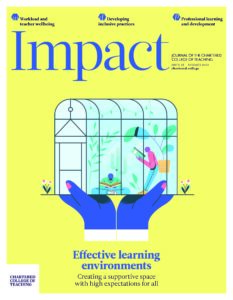Win–win: The impact of coaching on teachers and students in a Key Stage 5 study
Written by: Kate Jepson-Taylor and Sarah Parkin

8 min read
Kate Jepson-Taylor, Business and Economics Teacher, UK
Sarah Parkin, Head of Scholarship, City of London Freemen’s School, UK
Coaching is viewed as a powerful developmental tool, which enables individuals to make positive life and learning changes (Devine et al., 2013). As part of the Enquiring Teachers programme, a CPD programme that helps to develop a culture of enquiry and professional growth in schools, we were tasked with exploring the impact of teachers working as coaches with pupils. Unlike non-directive coaching, our approach to coaching involves the coach inputting suggestions based on their expertise and experience. Our research taught us that there has been limited research regarding this element of coaching. The largest UK-based research project was conducted in Sandwell from 2003 to 2007 and involved over 18 schools; the conclusion to this project was that ‘coaching can be an effective intervention with a non-adult population in helping students enhance examinati
Join us or sign in now to view the rest of this page
You're viewing this site as a guest, which only allows you to view a limited amount of content.
To view this page and get access to all our resources, join the Chartered College of Teaching (it's free for trainee teachers and half price for NQTs) or log in if you're already a member.
- Abdulla A (2018) Coaching Students in Secondary Schools: Closing the Gap Between Performance and Potential. London: Routledge.
- Bandura A (2006) Guide for constructing self-efficacy scales. In: Pajares F and Urdan P (eds) Self- Efficacy Beliefs of Adolescents, Vol. 5. Greenwich, Connecticut: Information Age Publishing, pp. 307–337.
- Devine M, Meyers R and Houssemand C (2013) How can coaching make a positive impact within educational settings? Procedia – Social and Behavioural Sciences 93: 1382–1389.
- Passmore J and Brown A (2009) Coaching non-adult students for enhanced examination performance: A longitudinal study. Coaching: An International Journal of Theory, Research and Practice 2(1): 54–64.
- Zimmerman BJ, Bandura A and Martinez-Pons M (1992) Self motivation for academic attainment: The role of self-efficacy beliefs and personal goal setting. American Educational Research Journal 29(3): 663–676.











I’m delighted to read about the impact of coaching on students. It was great to work with you both and see your work extending to a wider group. Hopefully more will be motivated to delve into coaching and maybe join the Enquiring Schools projects.